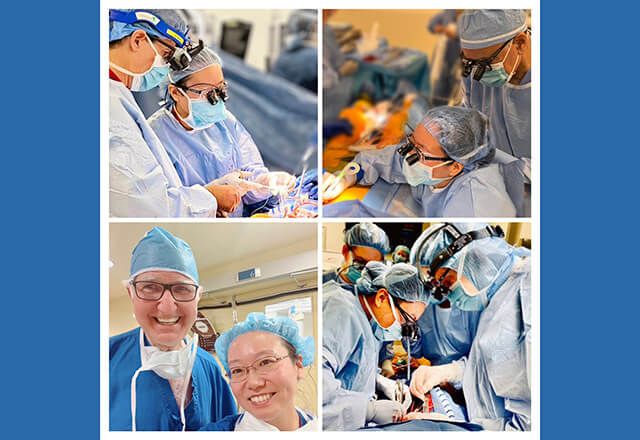Photos courtesy of the author.
The transformative power of a mentor’s guidance and support — its impact on both personal and professional growth — is beyond measure. As a cardiac surgery fellow, I have been fortunate enough to train under four exceptional mentors: James Gammie, Fayyaz Hashmi, Tirone David and Duke Cameron. Each of these surgeons has left an indelible mark on my development, and imparted invaluable lessons and shared unique perspectives that will remain with me throughout my career.
James Gammie emerged as a beacon during a pivotal period of uncertainty that followed my first year at Johns Hopkins in spring 2021. His influence on my professional development has been nothing short of profound. Dr. Gammie’s straightforward communication style ensured that I felt both heard and understood, while his empirical, analytical and logical methodologies challenged me to question established norms and examine prevailing dogma. His resolve and tenacity set a bar for me to strive toward. Our daily conversations, sustained even while I was training under Dr. David in Canada, showcased his unwavering commitment to continuous learning and improvement. In moments when self-doubt shrouded me, Dr. Gammie navigated this terrain with rare empathy. His willingness to share personal insecurities — an unusual trait in a field often marred by arrogance — provided a comforting beacon. To bolster my confidence, he once gave a striking endorsement in the OR, saying he would trust me to repair his own mitral valve. My mother’s astute observation encapsulates his influence best: “Dr. Gammie is your mentor because he makes you better every day.”
Fayyaz Hashmi, known affectionately by Dr. Gammie and me as “Jesus” because of his surgical finesse, has been a guiding light in my career. I met Dr. Hashmi in the winter of 2020, and he quickly became an integral part of my learning experience. His humility, composure and deep care for patients have made a lasting impression on me. Dr. Hashmi’s calm demeanor in the operating room, even in the most trying situations, is nothing short of miraculous. He treats every patient with genuine concern, taking the time to say hello to intubated patients and comforting family members. His unwavering commitment to his patients and their well-being inspires me to approach my practice with the same level of compassion and dedication. He has also guided me through performing off-pump CABG (coronary artery bypass surgery without cardiopulmonary bypass) with the PA while standing aside, allowing me to develop my skills while guiding me at the same time. His commitment to helping others extends beyond the hospital — he travels to Pakistan annually to operate on people who cannot afford surgeries.
Tirone David, a world-renowned pioneer in cardiac surgery, has been another influential mentor. I had the privilege of training under him for a month and a half this year as a visiting fellow at the University of Toronto. Despite his packed schedule, he took time to make sure that I was always learning. “Why do you think we do it this way?” he would ask in the middle of an operation. Dr. David's humility is striking. He often asserts, “I’m not fast, just consistent.” His openness to discussing his mistakes as learning opportunities for others is a testament to his commitment to nurturing the next generation of surgeons. After my time at Toronto, I would still email him frequently whenever I had questions, and he would always reply within a day with a detailed explanation.
Duke Cameron returned to Johns Hopkins in March of this year after six years at Massachusetts General Hospital, and I have had the honor of working closely with him ever since. His commitment to patient care is unparalleled. Dr. Cameron would stay overnight at the hospital if a patient was unstable and call patients the night before surgery to ensure they had no further questions. Dr. Cameron has invested time in discussing my career plans and guiding my academic development. He has facilitated opportunities for me to visit other surgeons, introduced me to colleagues at national meetings and helped establish international collaborations. His readiness to treat me as a junior colleague, combined with his surgical acumen and our shared interest in data visualization, have made our working relationship truly collaborative and enriching.
These mentors have imprinted their legacy onto my approach to patient care, education and professional advancement. Their unique perspectives and distinct qualities have enriched my educational journey and motivated me to consistently strive for excellence.
As I navigate the field of cardiac surgery, I am deeply grateful for the opportunity to learn from these extraordinary mentors. Their collective wisdom and unyielding support have shaped my surgical career. The Chinese proverb, “A teacher instructs, imparts professional knowledge and resolves doubts,” captures the essence of their role in my journey. Inspired by them, I hope to honor their legacy by becoming such a mentor for the next generation of surgeons.
Related Content
- Surgery Simulation During the Pandemic
- How Mentoring a High School Student Helped Me Plan for My Future
- A Day When a Young Medical Student Tried to Feel Like an Expert Surgeon
Want to read more from the Johns Hopkins School of Medicine? Subscribe to the Biomedical Odyssey blog and receive new posts directly in your inbox.
